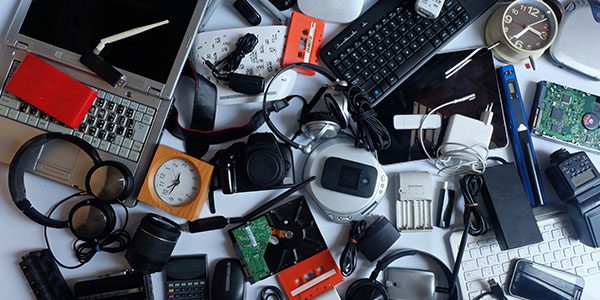Go Eco-friendly with R2 Certification Electronic Devices Recycling Solutions: Prioritize the Earth
Go Eco-friendly with R2 Certification Electronic Devices Recycling Solutions: Prioritize the Earth
Blog Article
Elevate Your E-Waste Monitoring With R2 Accreditation: a Detailed Review
One key technique to raise e-waste monitoring practices is by obtaining R2 accreditation. By checking out the advantages and processes connected with R2 accreditation, a much deeper understanding of how it can transform e-waste administration methods emerges, shedding light on a course towards sustainability and moral disposal practices.
Value of E-Waste Management

When e-waste is not handled properly, these hazardous compounds can permeate into the environment, creating harm to wildlife and possibly getting in the food cycle, positioning risks to human wellness. The improper disposal of e-waste contributes to contamination and greenhouse gas exhausts, exacerbating environment adjustment and ecological degradation.

Advantages of R2 Certification

To start with, R2 accreditation boosts credibility by showcasing a company's commitment to sustainable techniques. It assures clients, companions, and stakeholders that the firm abides by rigid criteria for e-waste monitoring - r2 certification. This reliability can result in increased trust and enhanced partnerships with customers that prioritize environmental duty
Secondly, R2 accreditation aids minimize risks connected with improper e-waste disposal. By adhering to the stringent guidelines stated by the certification, companies can reduce the probability of information breaches, ecological contamination, and lawful consequences. This positive method safeguards the business's track record and lessens potential obligations.
Lastly, R2 accreditation shows a commitment to environmental stewardship - r2 certification. By responsibly managing digital waste via licensed procedures, organizations add to the preservation of sources, decrease of pollution, and promotion of a circular economic situation. This dedication not only benefits the atmosphere however additionally aligns with advancing consumer expectations for sustainable business techniques
R2 Qualification Refine Overview
Having actually developed the benefits of R2 certification in advertising trustworthiness, danger reduction, and ecological stewardship, it is important to now outline the detailed visit this web-site process associated with getting this certification. The R2 certification process begins with a detailed evaluation of the organization's functional policies and procedures to guarantee compliance with the R2 standard. This initial evaluation is essential in recognizing any gaps that need to be resolved prior to continuing additionally.
When the organization's practices align with the R2 basic demands, an independent third-party auditor carries out an on-site audit to examine the application and effectiveness of these methods. This audit includes a thorough review of documentation, meetings with staff, and physical examinations of centers to validate compliance.
Following a successful audit, the company gets an accreditation choice based on the auditor's searchings for. If accepted, the company is approved R2 qualification, showing its commitment to responsible e-waste monitoring. It is vital to keep in mind that preserving R2 accreditation needs continuous conformity with the requirement's requirements and regular audits to make sure ongoing adherence to ideal methods in e-waste recycling and disposal.
Trick Standards for R2 Conformity
An essential facet of accomplishing R2 compliance is making sure that all digital waste (e-waste) processing facilities fulfill stringent ecological and safety criteria. To adhere to R2 demands, organizations have to follow key More about the author standards that focus on responsible e-waste management techniques. These criteria consist of executing a recorded environmental, wellness, and safety monitoring system, guaranteeing the secure handling of data-containing devices, and performing detailed downstream due diligence to track the final location of e-waste products.
Additionally, R2 compliance demands the proper screening, refurbishment, and recycling of digital tools to prolong its beneficial life and minimize ecological effect. Facilities seeking R2 accreditation need to additionally prioritize worker health and wellness by providing necessary training, individual protective tools, and a risk-free working environment. Additionally, keeping comprehensive records of e-waste processing activities and routinely undergoing audits by accredited certifying bodies are crucial elements of demonstrating ongoing compliance with R2 requirements.
Impacts of Sustainable E-Waste Practices
The execution of lasting e-waste methods based on R2 conformity not only makes sure ecological and safety requirements are met but additionally significantly impacts the total lifecycle of digital items. By sticking to R2 requirements, electronic waste monitoring processes end up being a lot more efficient, decreasing the environmental footprint of electronic products. Sustainable e-waste practices facilitate the proper disposal of electronic components, ensuring that harmful products are managed responsibly and do not end up contaminating the environment.
In addition, lasting e-waste methods can add to task development in the recycling and refurbishment industries, promoting economic development while promoting environmental duty. Overall, the adoption of lasting e-waste techniques under R2 qualification serves as a crucial step towards achieving a much more eco sustainable electronics industry.
Final Thought
Finally, carrying out proper e-waste monitoring methods is essential for environmental sustainability and resource conservation. R2 qualification plays a crucial role in ensuring responsible handling and disposal of electronic waste. By sticking to the rigid standards established forth by R2 criteria, organizations can not just minimize their environmental effect but likewise add to a more lasting future for generations to find.
One key visit their website technique to raise e-waste monitoring methods is by obtaining R2 accreditation. By exploring the processes and benefits connected with R2 accreditation, a much deeper understanding of just how it can transform e-waste administration strategies arises, shedding light on a path towards sustainability and ethical disposal practices.
The R2 certification procedure begins with a comprehensive evaluation of the organization's operational plans and treatments to make certain conformity with the R2 requirement. If accepted, the organization is granted R2 accreditation, showing its commitment to accountable e-waste monitoring. Generally, the fostering of sustainable e-waste techniques under R2 accreditation offers as a crucial action in the direction of attaining a more environmentally lasting electronic devices industry.
Report this page